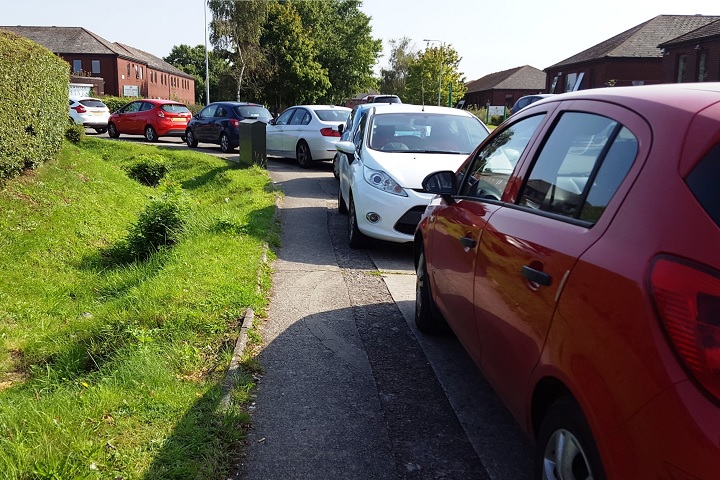
The Welsh Government is to give councils powers to crack down on pavement parking – but has fallen short of introducing an outright ban.
Speaking on 13 October, Lee Waters, Wales’ deputy minister for economy and transport, confirmed it is accepting all 10 recommendations of the Welsh Pavement Parking Taskforce.
The independent panel highlighted the need to give councils additional civil enforcement powers to fine problem parkers. This will come into force from July 2022.
However, it rejected an outright ban on pavement parking, which it says would be ‘slow and complex’ to implement.
Lee Waters said: “The current law is not as clear as it could be.
“There is no specific offence of parking on pavements, and although the police can enforce the existing criminal offence of causing ‘unnecessary obstruction of any part of the highway’, it is rarely enforced.
“We want more people to walk for short journeys and yet we tolerate an environment that is often not pedestrian friendly; too many routes are cluttered or blocked. A recent survey found that 83% of people in Wales view it as a real problem.
“We recognise that in some streets there are too many cars for the space available and we don’t want to penalise people who have no alternative.
“This approach lets councils target hot spots and vary its approach depending on local circumstances.”
Led by respected transport engineer Phil Jones, the Welsh Pavement Parking Taskforce was set up last summer.
Mr Jones also chaired the taskforce on 20mph local speed limits. In July the Senedd backed proposals for a 20mph default speed limit in residential areas, which the Welsh Government intends to be in force by April 2023.
Lee Waters added: “Taken together these two initiatives have real potential to save lives, and rebalance the environment in favour of pedestrians to create communities that put people before cars.”
The debate makes interesting reading. It is heartening to see cross-party support for action to deal with this blight. It’s a positive step forward to see politicians taking the issue seriously at last. In 2001 (when I was living in England) I wrote to my MP inviting him to support the recommendation of a Select Committee that pavement parking be outlawed. His reply made it apparent he was not interested, and he enclosed a letter from the then minister stating that it would be dangerous to ban pavement parking as it would block access to fire engines. Thank goodness things have moved on since then. I remain concerned that the proposals do not go far enough to be effective (especially as it appears any given local authority can choose not to act), but will hope that events will prove me wrong.
Vincent Edwards, Swansea
--2
The “Wales solution” as proposed by the Task Force Group is a pragmatic one based on reality and full of common sense. Ministers are pretty well clued up on the unreality and impracticality of a full Wales-wide pavement parking ban and see this recommendation as the right way forward. If you want to go beyond the report, read the debate in the Senedd (Welsh Parliament) here:-
https://record.assembly.wales/Plenary/6594#C322123
Pat, Wales
0
I would prefer a London-style prohibition of pavement parking (except where specifically permitted) even if it would take five years to implement – I note the authors of the report seem to assume that virtually any parking on the pavement will be regarded as obstruction – by local authorities, the civil courts and motorists. I hope they are right. My worry is that ambiguity over what constitutes obstruction will continue, and civil court judges will apply the “room for a double buggy” test. Where there is ambiguity there will be non-compliance, non-enforcement and, where matters come to court, adverse decisions. I don’t know if the Welsh government has the power to issue guidelines to all interested parties (including the courts) in line with the recommendations of the Report.
Unless I missed it, the Report does not seem to deal with the issue of parking on grass verges – a form of vandalism which is increasingly normalised, and I assume local authorities will not have the power to tow away offending vehicles. It will be necessary to give clarity to blue badge holders (a minority of whom, unfortunately, think they can park anywhere), for their benefit and for the benefit of pedestrians generally.
For all my pessimism I am relieved to see that government is finally addressing an issue which successive governments have done their best to evade.
Vincent Edwards, Swansea
--4
The pavement parking proposals for Wales recommended by the Task Force Group are the best balanced solution possible and I support the principle that underpins the decision.
Timescale for implementation is less certain though as changes to legislation are required and the timeline for that work cannot be guaranteed.
Pat, Wales
0